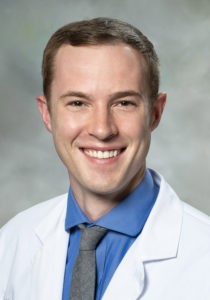Maintaining Long-Term Mobility

Dr. Lucas Bider, Physiatrist with Rockhill Orthopaedic Specialists

Lucas Bider, MD, a physiatrist at Rockhill Orthopedics Specialists in Kansas City, Missouri, takes a whole-patient approach to focus on the restoration and maintenance of function. He has helped patients prevent and recover faster from musculoskeletal conditions including neck pain, back pain, joint pain, and muscle or tendon injuries.
Dr. Bider is his patients’ partner in identifying their goals and maximizing their physical ability to pursue the life they love. Here, Dr. Bider offers insight into treatments and preventions:
Q: What is the scope of your practice?
A: As a physiatrist, I specialize in the management of muscle, bone, and nerve disorders that impair function in patients. I focus my practice on treating these conditions for outpatient orthopedic patients.
I work closely with therapists to offer a variety of pain-relieving techniques and injections. These include electrodiagnostic testing to identify neurologic problems. I also enjoy counseling patients, creating individualized plans to help them achieve their health goals.
Q: Who might benefit from seeing a physiatrist?
A: Anyone with pain from physical impairments that limit their ability to enjoy their life should consider seeing a physiatrist to help identify treatment and improve their quality of life.
Q: Can injuries be addressed effectively through non-surgical management?
A: Absolutely. Targeted physical therapy, medications, and/or injections are some of our best tools in the management of musculoskeletal and neurological injuries. These conservative measures are frequently successful in relieving patients’ symptoms and promoting their long-term health. There are, however, times when surgery is necessary. That’s why the role of my surgical partners is so important — together, we can help patients navigate this decision.
Q: How can common injuries be prevented?
A: A healthy diet and lifestyle are the simplest and most effective ways to promote well-being. Many people think this means eating nothing but vegetables and committing to traditional fitness training in a gym. If that sounds ideal to you — fantastic, go for it! Thankfully, there are many other options for the rest of us. Selecting foods and activities that you genuinely enjoy and pursuing them in moderation as well as prioritizing sleep and mental health is key. I would love the opportunity to discuss what this would look like in your life or situation.
Q: How early should we be thinking about chronic pain prevention?
A: It’s never too early to start making efforts to maintain our long-term health. The habits we develop in our younger years in many ways dictate how our bodies will function as we age. Conversely, it’s also never too late to make positive changes to improve our health. Incorporating healthy behavior patterns at any time in life is well worth the effort.
Q: Who is most at risk from these injuries or conditions?
A: Musculoskeletal and neurological pathologies occur for a variety of reasons and affect a broad spectrum of patients. Some are because of a specific injury, while others are due to repetitive wear and tear on body structures, and still others are related to genetic and disease processes. Many disorders are the results of a combination of these elements and are aggravated by unhealthy lifestyle factors including obesity, physical inactivity, and substance use.
I see patients ranging from high school age to more than 100 years old, individualizing treatment to their stage of life.
Q: Why did you choose this field?
A: I have been fortunate enough to work alongside patients as they made incredible recoveries from severely disabling conditions.
In my training, I distinctly remember caring for a young girl who was in a high-speed car wreck. She had numerous musculoskeletal and neurological injuries. When I first met her, she could hardly move or speak. Through targeted treatments and dedication on the part of the patient, she had improved such that no one would have known the extent of the injuries she had sustained.
At her last office visit, she had returned to school and was living a normal life. Nothing is more encouraging or validating to physicians than successfully helping patients achieve their goals.
For more information on Dr. Lucas Bider and Rockhill Orthopaedic Specialists, call 816-246-4302 or visit saintlukeskc.org/rockhill.






